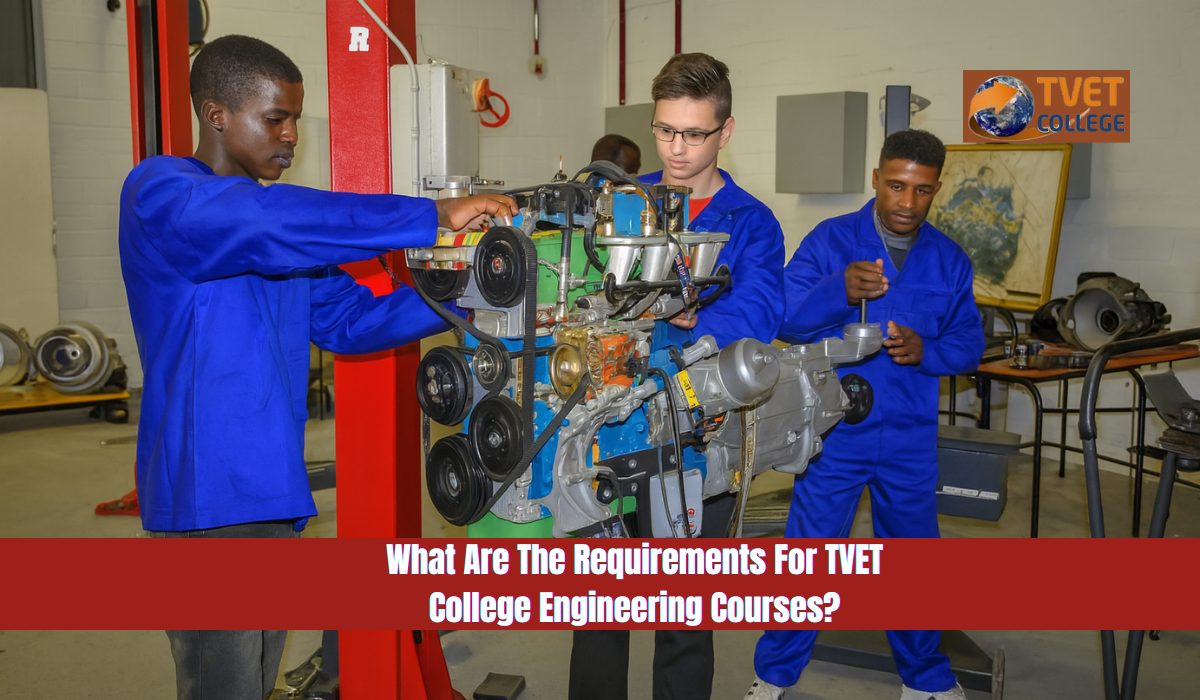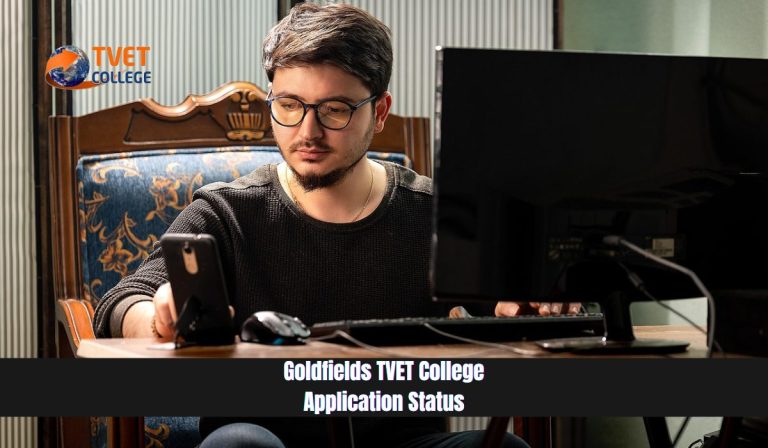What Are The Requirements For TVET College Engineering Courses?

What Are The Requirements For TVET College Engineering Courses? TVET College Engineering Courses are among the most sought-after programs in South Africa vocational education landscape. With over 50 TVET Colleges across the country offering Engineering qualifications, these institutions provide an excellent pathway for students who prefer practical, hands-on careers in the technical and engineering fields.
This article explores in detail the requirements for TVET College Engineering courses, the types of engineering qualifications offered, and how to apply. If you’re a student considering a future in engineering through a TVET college, read on to learn everything you need to know.
Understanding TVET Colleges in South Africa
Technical and Vocational Education and Training (TVET) Colleges are an essential part of South Africa’s post-school education and training system. They are geared toward developing practical skills, knowledge, and competencies needed for the workforce, especially in technical fields like engineering, construction, and information technology.
These colleges are ideal for students who:
- Prefer practical learning over theoretical university programs
- Want to enter the workforce quickly
- Need affordable access to tertiary education
- Seek nationally recognized qualifications
Engineering Courses Offered at TVET Colleges
TVET Colleges offer Engineering qualifications under two main types of programs:
- National Certificate Vocational (NCV)
- Report 191/NATED Programmes
Let’s explore what each entails and the respective TVET College Engineering course requirements.
1. National Certificate Vocational (NCV)
The NCV program is a skills-focused qualification designed for learners who have completed at least Grade 9. This program combines academic subjects with practical, job-focused modules in engineering.
NCV Engineering Requirements
To qualify for admission into an NCV Engineering program, applicants must meet one of the following:
| Entry Requirement | Details |
|---|---|
| Grade 9 Pass | A minimum pass in Grade 9 (NQF Level 1) is required. |
| AET Level 4 | Completion of the Adult Education and Training Level 4. |
| GETC | General Education and Training Certificate. |
| RPL Assessment | Recognition of Prior Learning (RPL) that confirms NQF Level 1 equivalency. |
| PLP Results | Pre-Learning Programme results if applicable. |
Each college may also have subject-specific requirements for engineering streams such as Electrical, Mechanical, or Civil Engineering. Hence, it is advisable to check the specific TVET College admission requirements before applying.
2. Report 191 or NATED Engineering Programmes
The NATED Engineering courses—also known as the National Accredited Technical Education Diploma programs—are designed for students who want a structured, level-based approach to technical learning. These programs progress from N1 to N6 and require students to complete both theoretical and practical components.
NATED Engineering Requirements
Here’s a detailed breakdown of entry requirements for each level of NATED Engineering Studies:
| NATED Level | Admission Requirement |
|---|---|
| N1 | Minimum Grade 9 pass with at least 30% in Mathematics. |
| N2 | N1 Certificate with Maths and Science OR Grade 12 pass with 30% in Mathematics. |
| N3 | N2 Certificate with Maths and Science OR Grade 12 pass with 40% in Mathematics and Science. |
| N4 | N3 Certificate with Maths and Science OR Grade 12 pass with 50% in Mathematics and Science. |
| N5 | National Certificate: N4 Engineering Studies. |
| N6 | National Certificate: N5 Engineering Studies. |
Upon completing N6, students must complete an 18-month practical internship in a recognized workplace to qualify for a National N Diploma, which is the final certification in this stream.
Types of Engineering Fields Offered at TVET Colleges
Depending on the college, the following Engineering disciplines are commonly available:
- Civil Engineering
- Mechanical Engineering
- Electrical Engineering
- Chemical Engineering
- Automotive Engineering
- Electronics and Digital Systems
- Water and Wastewater Treatment
- Fitting and Machining
- Welding and Fabrication
Each field may require a different combination of mathematics, physical science, and practical experience.
Additional Requirements for TVET College Engineering Courses
In addition to academic qualifications, certain colleges may impose additional admission criteria, such as:
- Entrance tests or assessments to evaluate basic numeracy and language skills.
- Medical clearances for certain physically demanding fields (e.g., welding or heavy machinery).
- Proof of previous work experience (especially for RPL candidates).
- Recommendation letters or motivational essays in rare cases.
Always visit the official website or contact the admissions office of your chosen TVET college for updated information.
How to Apply for TVET College Engineering Courses
Here are the general steps to follow when applying to a TVET College Engineering program:
- Research Available Colleges
Identify which of the 50+ TVET Colleges offer your preferred engineering course. - Check Admission Requirements
Review both general and specific course requirements for your level (NCV or NATED). - Gather Required Documents
Prepare copies of your latest academic results, certified ID, and proof of address. - Complete Online or Manual Application
Some colleges use online portals; others may require in-person submissions. - Pay Application Fee (if applicable)
Many public colleges have free applications, but confirm before applying. - Attend Admission Testing (if required)
Some colleges may call you for an assessment before confirming acceptance. - Wait for Acceptance and Registration Information
Accepted applicants will receive details regarding registration and class schedules.
Benefits of Studying Engineering at a TVET College
Here are several reasons to choose a TVET College Engineering course:
- Industry-Relevant Skills: You learn practical, job-ready skills aligned with market needs.
- Shorter Duration: Most programs are shorter than university degrees and more focused.
- Affordability: Lower fees compared to traditional universities, plus NSFAS funding support.
- Employment Opportunities: Engineering graduates are in demand in South Africa’s infrastructure, energy, and industrial sectors.
TVET Colleges Offering Engineering in South Africa
Here’s a sample list of TVET Colleges offering Engineering qualifications:
| College Name | Location | Engineering Programs Offered |
|---|---|---|
| Tshwane South TVET College | Gauteng | NCV & NATED |
| False Bay TVET College | Western Cape | NCV & NATED |
| Ekurhuleni East TVET College | Gauteng | NCV & NATED |
| Umfolozi TVET College | KwaZulu-Natal | NCV & NATED |
| Port Elizabeth TVET College | Eastern Cape | NCV & NATED |
| Capricorn TVET College | Limpopo | NCV & NATED |
Note: This is not a complete list. Visit each college’s website to view specific engineering programs and requirements.
Tips for TVET Engineering Applicants
- Apply Early: Deadlines vary by college, so apply well in advance.
- Improve Maths Skills: Mathematics is essential for engineering—brush up before applying.
- Use NSFAS: Many TVET students qualify for government funding via NSFAS.
- Seek Career Guidance: Talk to a counselor about the best engineering field for you.
FAQs
Can I study Engineering at a TVET College without Mathematics?
Ans: It depends on the level and program. Most NATED Engineering courses require at least 30–50% in Mathematics and Science, depending on the level. Some NCV programs may allow entry with a lower grade level, but Mathematics is generally encouraged.
Is Engineering at TVET Colleges funded by NSFAS?
Ans: Yes, NSFAS (National Student Financial Aid Scheme) covers tuition, accommodation, transport, and learning materials for eligible students at public TVET colleges, including those enrolled in Engineering courses.
What can I do after completing N6 in Engineering?
Ans: After completing N6 Engineering Studies, you must complete 18 months of practical workplace experience to obtain a National N Diploma. You can then work as a technician or apply for further studies, including a diploma or degree in engineering at a university of technology.
Conclusion
Choosing a TVET College Engineering course is a smart move for students passionate about building, designing, and solving real-world problems through technology. Whether you’re starting after Grade 9 or upgrading your skills, TVET colleges offer nationally recognized qualifications that can lead to meaningful employment or further study.












